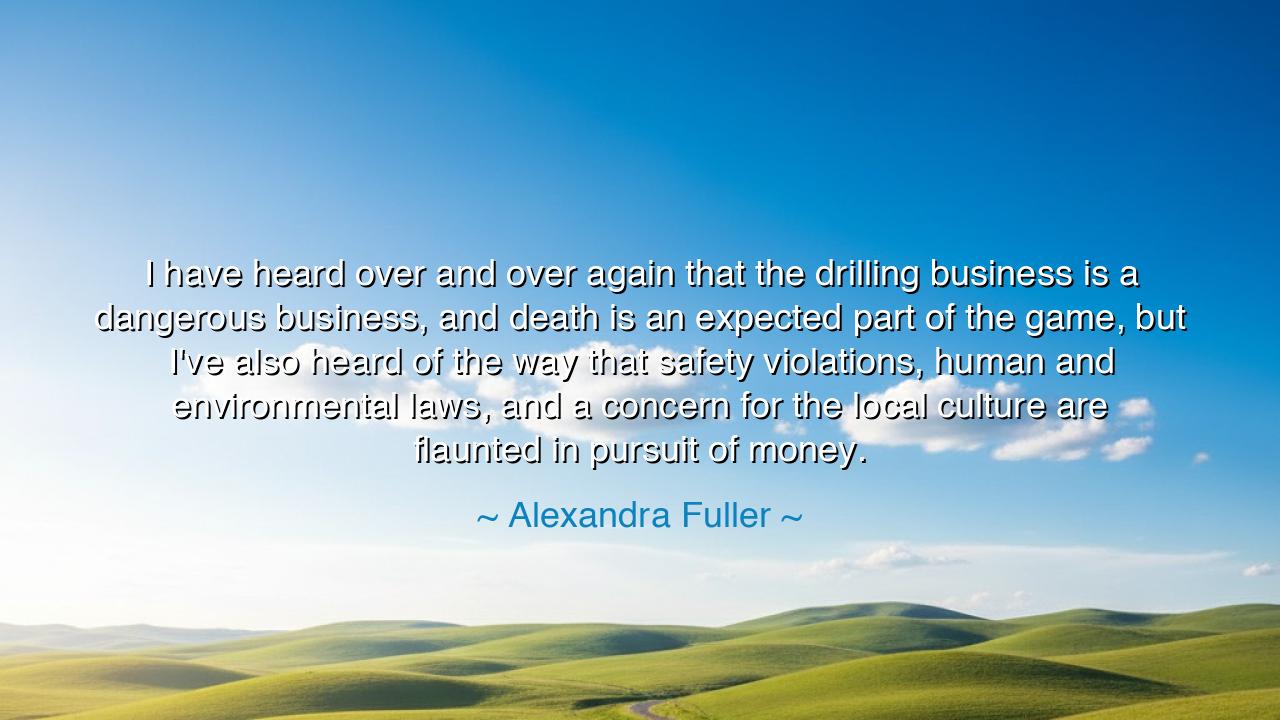
I have heard over and over again that the drilling business is a
I have heard over and over again that the drilling business is a dangerous business, and death is an expected part of the game, but I've also heard of the way that safety violations, human and environmental laws, and a concern for the local culture are flaunted in pursuit of money.






In a voice both mournful and resolute, Alexandra Fuller once said, “I have heard over and over again that the drilling business is a dangerous business, and death is an expected part of the game, but I've also heard of the way that safety violations, human and environmental laws, and a concern for the local culture are flaunted in pursuit of money.” Her words strike like a warning bell across the ages, echoing the eternal struggle between human ambition and moral restraint. They remind us that progress, when severed from conscience, becomes peril; that wealth gained without reverence for life and the land is but dust on the wind. Fuller, who has walked among the rugged landscapes of Africa and the American West, speaks as both witness and mourner—a chronicler of humanity’s triumphs and its blindness.
The origin of this quote comes from Fuller’s reflections on the oil and gas industry, particularly in the heartlands of America where she made her home after years in Africa. Having lived among communities shaped and scarred by extraction—the drilling rigs, the pipelines, the promise of prosperity and the shadow of danger—she came to see the moral paradox of modern industry. The drilling business, she notes, is indeed perilous; men risk their lives daily beneath the roar of machines and the blaze of flares. But what grieves her more deeply is the cold acceptance of such danger as “part of the game.” For when death becomes routine, compassion decays, and when the law is bent in service of profit, civilization forgets its soul.
Her lament recalls the timeless warnings of the ancients. In the writings of Solon of Athens, we are told that greed is the seed of decay—that when men worship gold above justice, they poison their own city. Fuller’s words are a modern echo of that truth. She does not condemn the work of industry itself—she condemns its carelessness, its willingness to sacrifice safety, humanity, and the earth upon the altar of gain. Her mention of “safety violations, human and environmental laws, and a concern for the local culture” unveils the full breadth of the wound: the suffering of the workers, the desecration of the land, and the erosion of communities that once thrived in harmony with nature.
History, too, bears witness to this recurring sin. One need only recall the tragedy of Deepwater Horizon in 2010—a catastrophe born of negligence and haste. Eleven souls perished in fire, and the sea, for months, vomited black poison into its own depths. It was not a failure of technology, but of conscience. The engineers and executives, driven by the hunger for profit, ignored warnings, cut corners, and silenced caution. Fuller’s words might well have been written as a lament for them—for the men who died, for the sea that was defiled, and for the civilization that still dares to call such destruction “the cost of doing business.”
Yet her tone is not one of bitterness alone—it is also a call to awakening. To speak of death as expected and of laws flaunted is to expose the moral numbness that seeps into a culture when it forgets its sacred responsibilities. Fuller invites us to remember that the earth is not an inert thing, but a living being, and that the communities who dwell upon it—those “local cultures” dismissed by corporations—are not obstacles to profit, but keepers of wisdom. Her words remind us that to exploit without listening, to build without care, is to sow the seeds of ruin in both the soil and the soul.
There is a parallel in the tale of the ancient Mesopotamians, whose fertile lands once flourished between the rivers Tigris and Euphrates. Through overuse, deforestation, and greed, they salted their own fields, turning paradise into desert. Their empires fell not from war, but from blindness—the same blindness Fuller warns against today. The patterns of history repeat, for man often learns not through memory but through loss. Yet within her sorrow lies a seed of hope: that awareness itself can break the cycle, that truth spoken bravely can stir conscience from its sleep.
Let this be the lesson her words carry through the centuries: that every act of creation demands accountability. Industry without ethics is no progress—it is destruction in disguise. The measure of civilization is not in its wealth, but in its reverence for life. Therefore, let those who work the fields of energy and invention remember the sanctity of what they touch. Let them honor the worker’s life as sacred, the law as covenant, and the land as mother.
And to all who hear, heed this: do not accept danger as destiny, nor greed as necessity. The earth does not belong to us; we belong to it. Each life lost, each law ignored, each river defiled diminishes the soul of humanity. So live and labor with reverence. Let your work leave behind not scars, but seeds. For as Alexandra Fuller reminds us, the pursuit of wealth without wisdom leads only to ruin—but the pursuit of progress joined with compassion can yet redeem the world.






AAdministratorAdministrator
Welcome, honored guests. Please leave a comment, we will respond soon